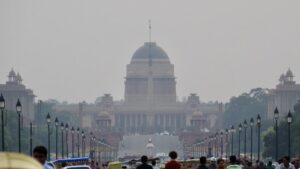Physical Address
23,24,25 & 26, 2nd Floor, Software Technology Park India, Opp: Garware Stadium,MIDC, Chikalthana, Aurangabad, Maharashtra – 431001 India
Physical Address
23,24,25 & 26, 2nd Floor, Software Technology Park India, Opp: Garware Stadium,MIDC, Chikalthana, Aurangabad, Maharashtra – 431001 India

India’s Ministry of Environment, Forest, and Climate Change has reported a dramatic reduction in stubble burning incidents following the doubling of fines. From November 6 to 27, 2024, stubble burning cases dropped 68% compared to the same period in 2023. Nationwide, incidents fell by 76.6% between 2022 and 2024, with Punjab witnessing a decline from 49,888 cases in 2022 to 10,821 in 2024, and Haryana seeing a reduction from 3,629 to 1,373. A record 5,783 FIRs were registered against farmers for stubble burning this season, marking a fivefold increase from last year, according to data from the Punjab Pollution Control Board (PPCB). Additionally, 5,454 red entries were made in revenue records to penalise erring farmers.
Stubble burning, the practice of setting fire to crop residues after harvest, is common in northern India during late October to early December. This method is cost-effective for farmers but significantly contributes to air pollution, particularly in Delhi and its surrounding regions, leading to heavy smog during winter.
New regulations introduced on November 7 doubled the penalties for stubble burning. Farmers with less than two acres face fines of Rs 5,000 per incident, those with two to five acres pay ₹10,000, and those with holdings above five acres are fined Rs 30,000.
Despite a reduction in stubble burning, Delhi’s air quality remains a concern. November saw severe air pollution, with AQI levels reaching “severe-plus” in some areas and a thick smog causing visibility issues and disrupting daily life. As a result, the state government implemented GRAP 4 measures, including school closures and halting construction activities.
In December, air quality improved, with 28 cities reporting “good” AQI levels for the first time in weeks. Around 13.2% of cities recorded “poor” or worse air quality, while two in five cities saw AQI levels below 100.
In Parliament, AAP MP Raghav Chadha emphasized the plight of farmers, arguing that they are forced to burn stubble due to a lack of affordable alternatives. He suggested a short-term subsidy of ₹2,500 per acre, jointly funded by the central and Punjab governments, to help farmers purchase anti-pollution equipment like happy seeders.
References:
Banner Image: Photo by Abhishek Choudhary on Unsplash